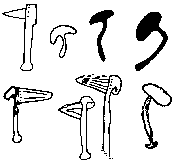Fox News: On Marijuana
Read the Whole Article
Painkiller Warnings Rekindle Debate Over Medical Marijuana
Tuesday, April 19, 2005
By C. Spencer Beggs
Frustrated researchers say the question is not whether marijuana could serve legitimate medical purposes. Marijuana has been looked at for a variety of medical applications. It can relieve intraocular pressure (search) caused by glaucoma (search), and it has been touted as an appetite stimulant for patients undergoing chemotherapy, suffering from AIDS wasting syndrome (search) or dementia.
More recently, it has been looked at to relieve the neuropathic pain — the so-called "phantom pain" — of patients with multiple sclerosis.
(snip)
The question, researchers say, is whether the benefits of marijuana outweigh the risks of its negative side effects, or whether the maladies can be better treated by other drugs. That's the very question the FDA used to evaluate Vioxx, Bextra and Celebrex, and one that researchers say the government won't let them answer about marijuana.
(snip)
Like Ecstasy, marijuana is classified as a Schedule I drug under the 1970 Controlled Substance Act, a group that includes heroin and LSD, and has been deemed by the government to have no medical benefit and to be highly addictive. But unlike other Schedule I drugs, which can be obtained through government-licensed contractors, marijuana can be legally obtained for research only from the NIDA.
(snip)
Of course, researchers like Halpern emphasize that the scheduling system was put in place with the intentions of protecting the public from junk science studies and keeping illicit drugs away from the public. But advocates for the research say political pandering, corporate greed and the power and influence of the pharmaceutical industry corrupt the system. The race to bring new drugs to the market is not only concerned with the health of the populace, they say, but also with the health of drug companies' stock portfolios, and a drug that patients can produce and use without their help is not good for drug makers' bottom line.
Please read the whole article at Fox News. Once you've done that, check out:
Fast Facts
Marijuana Fast Facts: Highs, Lows
Monday, April 18, 2005
By C. Spencer Beggs
-Texts from 2,000 years ago show that marijuana was used as a medicine in a variety of ancient cultures, including China, India, Greece and Persia.
(well, longer than that even. Prehistoric humans "used" cannabis. It wasn't dangerous then, if it was, we wouldn't be here today...
Dr. William C. Woodward, chief counsel to the American Medical Association, testified on behalf of the medical groups in 1937. The AMA feared that the Marijuana Tax Act would prevent research into legitimate medical uses for it. Woodward delivered a statement that "The American Medical Association knows of no evidence that marijuana is a dangerous drug."
(so. why are we throwing people in prison for possessing it?)
-Under federal law, marijuana cannot be prescribed by a doctor.
(But under Federal Law, the Federal Military can develope, possess, and threaten to "use" NUCLEAR WEAPONS!... just shows how much our government knows about safety anyway...)
When the Marijuana Tax Act was passed in 1937, the federal government wielded far less regulatory power than it does today and therefore imposed a "tax" on marijuana rather than prohibiting it outright. The act was worded very carefully so that the Supreme Court wouldn't overturn it for overstepping the bounds of regulating interstate commerce. The act mandated that anyone wishing to sell marijuana pay a transfer tax. Possession of marijuana without paying the tax was illegal. The required tax stamp, however, could only be issued to those already in possession of marijuana.
Research shows that long-term marijuana use is linked to some changes in the brain similar to those seen after long-term use of other drugs like cocaine and heroin. These studies have not been corroborated.
(yeah, it would be nice to know, in the "scientific" meaning of the word "know", how exactly the chemical agents in cannabis effect human cognitive architecture... it should also be noted that the Government has no problem prescribing "mind-altering" drugs like Adderall and Ritalin to school children. Does anyone else find this ironic?)
Marijuana is the nation's No. 1 recreational illegal drug. It is No. 3 if alcohol and tobacco are included.
(just goes to show what the REAL "gateway" drugs are...)
 the world is what we make it
the world is what we make it























